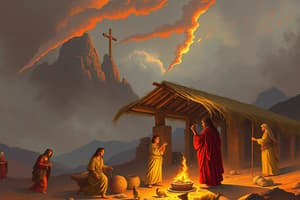Podcast
Questions and Answers
What was a characteristic feature of the earliest Christian communities?
What was a characteristic feature of the earliest Christian communities?
- Members met weekly on the Sabbath.
- They focused exclusively on written texts.
- They were highly structured and organized.
- Charismatic prophets wandered among them. (correct)
What was one of the main reasons the apostles organized the early Christian communities?
What was one of the main reasons the apostles organized the early Christian communities?
- To establish a formal church hierarchy immediately.
- To create a centralized government for Christians.
- To ensure that a second generation could keep Jesus' memory alive. (correct)
- To discourage any diversity in beliefs.
How did the Holy Spirit assist the early followers of Jesus?
How did the Holy Spirit assist the early followers of Jesus?
- By creating a detailed set of regulations.
- By sending them to distant lands for missions.
- By providing them with material wealth.
- By helping them interpret their experiences with Jesus. (correct)
Why was it necessary to organize the Christian community?
Why was it necessary to organize the Christian community?
What was the background of Paul before his conversion?
What was the background of Paul before his conversion?
What was a primary challenge the early Christians faced without a structured community?
What was a primary challenge the early Christians faced without a structured community?
What was a key function of charismatic prophets in the early communities?
What was a key function of charismatic prophets in the early communities?
What was the apostles' primary concern as they began organizing the early communities?
What was the apostles' primary concern as they began organizing the early communities?
What was Paul's initial view of the followers of Jesus before his conversion?
What was Paul's initial view of the followers of Jesus before his conversion?
What significant event occurred during Paul's conversion experience?
What significant event occurred during Paul's conversion experience?
How did Paul contribute to the early Christian community's outreach to Gentiles?
How did Paul contribute to the early Christian community's outreach to Gentiles?
What was one of Paul's key actions in establishing churches among Gentiles?
What was one of Paul's key actions in establishing churches among Gentiles?
What decision was influenced by Paul at the Council of Jerusalem?
What decision was influenced by Paul at the Council of Jerusalem?
What does the term 'conversion' imply in the context provided?
What does the term 'conversion' imply in the context provided?
What can be inferred about Paul's approach to teaching the message of Jesus?
What can be inferred about Paul's approach to teaching the message of Jesus?
What was one of the challenges Paul faced during his missionary activities?
What was one of the challenges Paul faced during his missionary activities?
Flashcards
Early Christian communities
Early Christian communities
Early followers of Jesus gathered for meals, led by charismatic prophets, but lacked formal structure.
Role of Apostles (early)
Role of Apostles (early)
Apostles, as church leaders, organized early Christian communities to preserve and share Jesus' teachings and practices.
Role of the Holy Spirit
Role of the Holy Spirit
The Holy Spirit guided early Christians in following Jesus' teachings and adapting to changing situations.
Need for Organization (Early Christian)
Need for Organization (Early Christian)
Signup and view all the flashcards
Paul's life (before conversion)
Paul's life (before conversion)
Signup and view all the flashcards
Paul's Conversion
Paul's Conversion
Signup and view all the flashcards
Paul's Mission
Paul's Mission
Signup and view all the flashcards
Gentile Inclusion
Gentile Inclusion
Signup and view all the flashcards
Council of Jerusalem
Council of Jerusalem
Signup and view all the flashcards
Conversion Experience
Conversion Experience
Signup and view all the flashcards
Paul's Persecution
Paul's Persecution
Signup and view all the flashcards
Paul's Journeys
Paul's Journeys
Signup and view all the flashcards
Study Notes
Early Christian Communities
- Earliest followers gathered after Sabbath, broke bread, as Jesus taught. Communities were unstructured, with wandering charismatic prophets.
- Apostles organized communities to ensure the memory of Jesus, plan practices and worship, for future generations.
- Holy Spirit guided followers, enabling them to interpret events and actions of Jesus.
- It empowered early members to respond to historical circumstances.
- Organizing communities, with guidelines, was important to avoid conflicts and guide members into a cohesive unit. This included clear structures, rules for decision making.
Paul's Mission
- Before conversion, Paul was Jewish Pharisee – opposed Jesus followers, seeking to imprison/execute Christians.
- Paul's vision and conversion profoundly changed his view and mission.
- Paul preached Jesus as the Messiah.
- He travelled extensively, establishing Christian communities throughout the Roman Empire.
- He wrote letters to various churches later included in the New Testament.
- Paul emphasized salvation for all (Jews & Gentiles) without adhering to Jewish laws (circumcision, dietary restrictions). This broad outreach was instrumental in Christianity’s expansion.
- The Council of Jerusalem supported Paul's approach, welcoming Gentiles to the faith.
- The concept of "conversion" includes both a change of mind/heart and how one behaves and prioritizes.
- Paul’s conversion experience is an example of how changing circumstances and personal experiences can effect priorities. The story of a student's conversion is given as an example.
- Paul's life before and after conversion is a notable turn when he became a crucial advocate in the early spread of Christianity beyond Jewish boundaries. His travels and established churches were important to the expansion of Christianity.
Studying That Suits You
Use AI to generate personalized quizzes and flashcards to suit your learning preferences.




